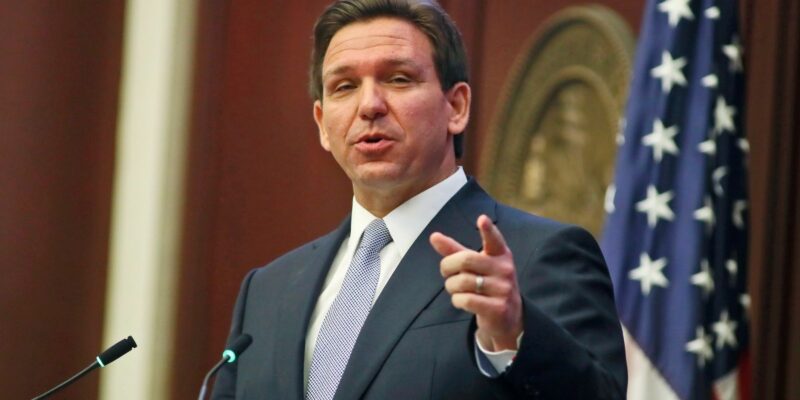
Update, April 19: In a dramatic expansion of last year’s controversial “Don’t Say Gay” law in Florida, the State Board of Education voted today to ban classroom instruction on gender identity and sexual orientation through 12th grade. The rules allow an exemption for sexual education or health lessons, as long as parents are given the choice to opt their student out.
A year ago, Florida Gov. Ron DeSantis signed a sharply controversial bill restricting discussion of LGBTQ issues in public schools, claiming it would fight “indoctrination.” The legislation, known as the “Parental Rights in Education Bill” was dubbed by critics as the “Don’t Say Gay” bill. Its supporters argued that its scope was limited: It banned classroom instruction on sexual orientation or gender identity in kindergarten through third grade, and required discussions with older students to be “age-appropriate or developmentally appropriate.”
Now that pretense is collapsing, as DeSantis’s administration is seeking to expand the ban all the way through high school. Under a rule now proposed by the Florida Department of Education, teachers in grades 4 through 12 “shall not intentionally provide classroom instruction” on sexual orientation or gender identity—or else they could be stripped of their licenses.
The rule makes exceptions for lessons “expressly required by state academic standards” and for health courses that parents may opt out of for their children. Education Commissioner Manny Diaz signed off on the proposed rule, according to the South Florida Sun-Sentinel.
Other bills to expand the reach of “Parental Rights in Education Bill” have been introduced in the Florida legislature. But pursuing the rule though administrative channels sidesteps much of the political debate that can come with attempting to pass controversial legislation. Both the state Board of Education and the state Education Department are led by DeSantis appointees, as the Human Rights Campaign pointed out in a press release decrying the proposed rule, which it says will “block teachers from providing safe, inclusive classrooms,” stigmatize LGBTQ people, and isolate queer kids.
This strategy of pushing anti-LGBTQ policies using executive power is nothing new for DeSantis, whose appointees pushed a ban on gender-affirming care for trans youth through state medical boards earlier this year. (That new rule is now facing a lawsuit from the parents of four children.) As I reported last year:
In Florida, lawmakers have rejected a gender-affirming care ban every year since 2020. That’s a problem for Republican Gov. Ron DeSantis, who spent much of the last year making political hay off laws that target LGBTQ kids. In recent months, DeSantis—who is widely believed to be preparing a presidential run—has ramped up the anti-trans rhetoric in an apparent appeal to his party’s base, with its mix of traditional religious conservatives and culture warriors concerned about “woke ideology.” In fundraising messages this cycle, the governor has repeatedly blustered that kindergarteners were being “indoctrinated with transgenderism”; in public appearances, he has falsely claimed that surgeons were operating on young children. “When they say ‘gender-affirming care,’ what they mean a lot of the times is you’re castrating a young boy, you’re sterilizing a young girl, you’re doing mastectomies for these very young girls,” DeSantis lied to a right-wing podcast host in May. “I’m fighting to protect our children,” the governor promised in an email to supporters later that month. At an August press conference, he added an applause-drawing, headline-grabbing line: “I think these doctors need to get sued for what’s happening.”
So to carry out his agenda on transgender health care, the governor has needed to go around lawmakers and take a unique line of attack: Weaponizing state agencies, including the medical board, to do the dirty work for him.
The Florida Board of Education is currently taking public comments on the proposed rule, which is scheduled for a vote on April 19.















